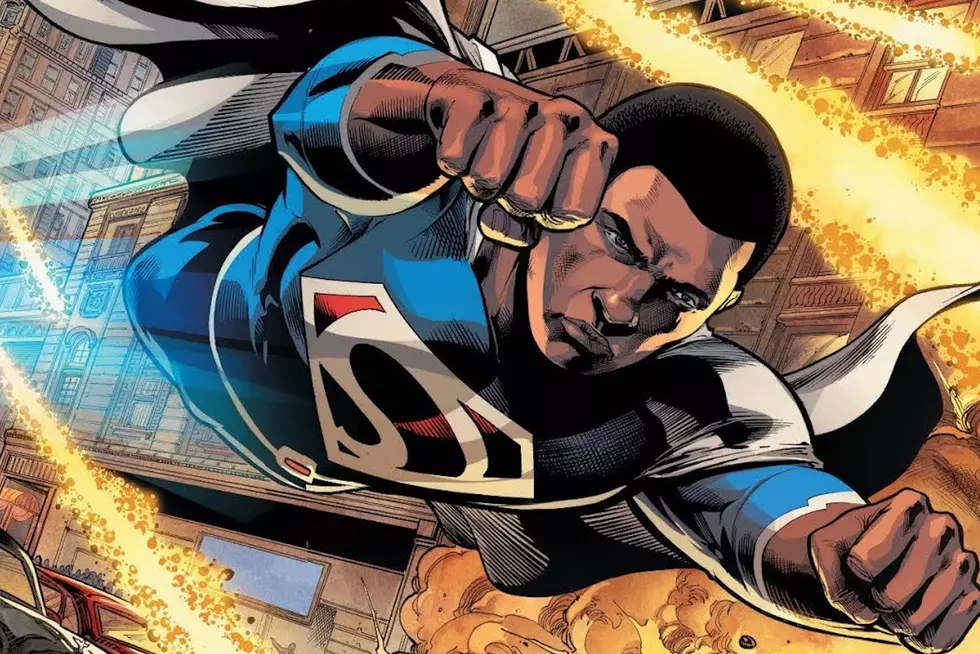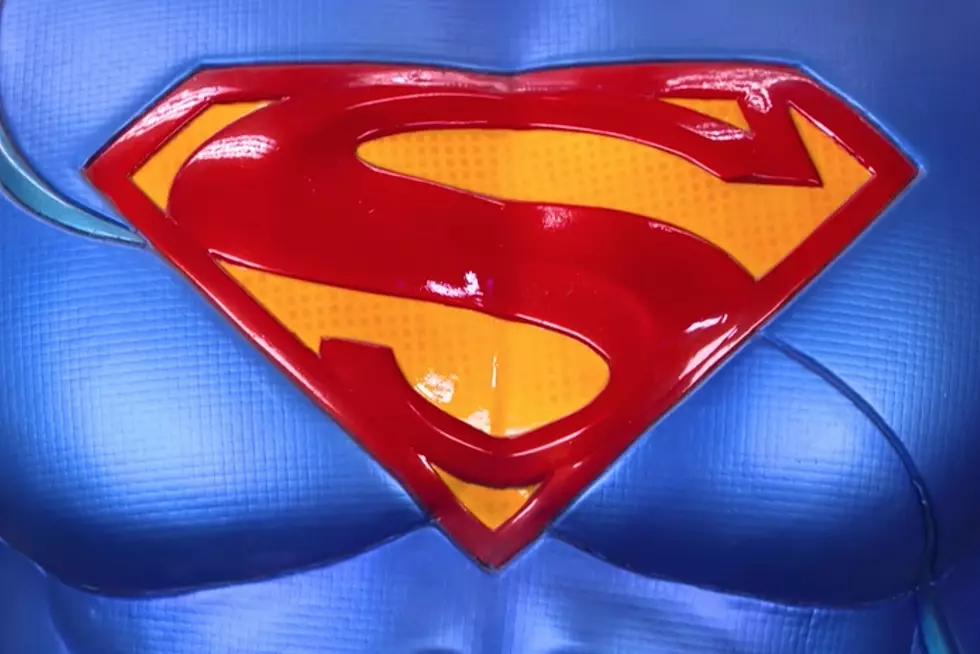
Chris Roberson & Phil Hester on Taking Over ‘Superman’ and ‘Wonder Woman’ From JMS

Last month, DC announced that in the face of fill-in issues and mounting delays, writer J. Michael Stracynski would be stepping down as the writer of Superman and Wonder Woman without finishing his much-publicized stories and instead focus on a sequel to the Superman: Earth One graphic novel.
But rather than abandoning Straczynski's stories -- which involved Superman's decision to walk across America and a reboot and new costume for Wonder Woman -- DC opted to bring in two new writers to finish them, beginning in March with Superman 707 and Wonder Woman 607. Under normal circumstances, this wouldn't be a big deal, but when the writers in question are Chris Roberson, whose iZombie has been one of the best new comics of 2010, on Superman and Phil Hester, a veteran writer/artist best known currently as co-creator of Firebreather, on Wonder Woman, things get a little more interesting. That's why today, ComicsAlliance sat down to ask them just what it's like to take over a high-profile title from someone else, and what they plan to do now that the spotlight is on them. ComicsAlliance: When you're working from someone else's notes on a story that was meant to be a big departure from what the characters had been doing previously, how much of yourself do you feel like you can bring to the titles?
ComicsAlliance: When you're working from someone else's notes on a story that was meant to be a big departure from what the characters had been doing previously, how much of yourself do you feel like you can bring to the titles?
Phil Hester: I'm lucky in that J. Michael Straczynski left me with notes that are mostly big picture in nature. He set out some specific storytelling goals, but DC has been very accommodating in letting me reach those goals my way. I admit to being a little petrified when given the assignment, but now that I'm into it I feel as close to this as one of my creator owned projects. I don't think it will take long for anyone who has followed my past stuff to hear my voice in these stories.
Chris Roberson: When I signed on board, Matt Idelson and Wil Moss, the editors on the Superman titles, sent me JMS's outline for the remainder of the "Grounded" storyline. And while it mapped out all of the places that Superman would be visiting along the way, and in terms of character, spells out the place where Superman needs to end up at the end of the journey. There's a lot of room for side-trips and improvisation along the way.
CA: Do the current approaches to the character match up with your own take on how Superman and Wonder Woman should work? How do you plan to adjust the stories to make them more distinctly yours?
Roberson: I think that there is a crucial question at the core of the "Grounded" storyline, one that was first asked by Elliot S! Maggin in one of my favorite Superman stories: "Must There Be A Superman?" It makes perfect sense that Superman would find himself asking that question in the wake of losing his adoptive father and the destruction of New Krypton. In the course of the "New Krypton" storyline, Superman had one of his most cherished wishes granted -- that Krypton might live again, and that he would be reunited with his Kryptonian family.
But when nothing turned out the way he'd hoped, and then Krypton was lost all over again, Superman was devastated. It stands to reason that a series of events that traumatic would cause him to lose faith in his most cherished beliefs -- namely, Truth, Justice, and the American Way. At the core of "Grounded," I think, is a Superman who is trying to rediscover his faith in those ideals, and to answer for himself that crucial question: "Must there be a Superman?"

Hester: I probably revere Wonder Woman a little more than I should and JMS' approach sort of broke some barriers I may not have felt I had the authority to break. That said, now that we're here it gives me the opportunity to really define what I think is important about the character. I've been allowed to introduce some characters, and redefine some familiar ones, to make them serve as counterpoints to Diana's. We'll see the kind of heroine she could become, even the kind of villain she could become, put in front of her almost as crucibles. Her choices will define her heroism more than her circumstances used to in the past.
CA: What other earlier stories are going to influence your take on the characters?
 Hester: Well, I've recently read a lot of Golden Age stories to admire their enchanting, enthusiastic nuttiness, but I have to say my favorite take on the character has to be George Perez's. Maybe it's a function of my age, but that's the era I recall most fondly.
Hester: Well, I've recently read a lot of Golden Age stories to admire their enchanting, enthusiastic nuttiness, but I have to say my favorite take on the character has to be George Perez's. Maybe it's a function of my age, but that's the era I recall most fondly.
Roberson: I've always had a fondness for the Mort Weisenger era, when the ideas came fast and big -- the Phantom Zone, Kandor, the Legion of Super-Heroes, Krypto, Supergirl, etc-but personally my favorite era of Superman has always been the Bronze Age under the direction of Julius Schwartz, and in particular the stories of Elliot S! Maggin. In any of Maggin's comics, and in particular in his novels, you really get the essence of Superman distilled, and Maggin was able to communicate better than just about any other writer before or since just what Superman was all about: "There is a right and a wrong in this universe, and the distinction isn't hard to make."
That said, I have been bowled over in the last decade or so by Grant Morrison's take on the character, and in particular his All Star Superman and Superman Beyond. What makes Morrison's Superman stories so fantastic, I think, is that they combine the best of Maggin (the character himself, his motivations, and his place in society) with the best of the Weisenger era (the big, fast, CRAZY ideas).
CA: Do you plan to divert from what was already established? Like, say, having Superman levitate a little, or maybe use the Justice Jogger instead of walking?
Roberson: Superman is on a road trip across country, and anyone who's made a cross-country journey knows that side-trips and diversions are inevitable. Superman will end up where he's supposed to end up, but he's going to be doing a little sightseeing along the way.
CA: Since "Grounded" is meant to be a story about making Superman relatable to the average American, how many McRibs can we expect to see him eat as he moves across the country? How many Double Downs?
Roberson: These questions arrived without attribution, so I don't know who wrote them, but it's at this point in the interview that I'm reasonably certain that Chris Sims is behind at least some of them.

Roberson: And while Superman might sample a McRib, just once, everybody knows that his meal of choice is Beef Bourguignon with ketchup. (The Double Down, though, might be beyond even him...)
CA: What about with Wonder Woman? Have you been tempted to have her "accidentally" leave her leather jacket at a
diner?
Hester: You'll have to buy the book, Chris!
CA: In the spirit of updating her for today's audience, have you considered giving Wonder Woman other, more modern forms of invisible transportation? Invisible Segway? Invisible Heelys?
Hester: Invisible Shape-Ups? Or one of those horrifying swivel scooters? Imagine seeing someone writhing violently toward you while hovering four inches off the ground.
 CA: Over the past few years, Wonder Woman's become one of DC's more violent books, with neck-snapping and bashing people so hard that her bracelet leaves a W on their face. Is that something you think is necessary for the character and her appeal, or something you see keeping her from being as accessible as other characters?
CA: Over the past few years, Wonder Woman's become one of DC's more violent books, with neck-snapping and bashing people so hard that her bracelet leaves a W on their face. Is that something you think is necessary for the character and her appeal, or something you see keeping her from being as accessible as other characters?
Hester: It's something we're tackling head on in this series. I don't think it's necessary, but it is a comic book and people's asses have to be kicked. We're going to watch her grow throughout this arc, and come to see her recent penchant for brutal violence as a personality flaw and a hindrance to her ultimate goal. Will she work through it in time to become the transcendent figure she should be? That's sort of the crux of the book in some ways.
CA: The initial issues of Straczynski's runs on both Superman and Wonder Woman got a varied reaction from readers. What's the one thing you'd say to get people who didn't like those issues to check out your stories?
Hester: I kind of think writers worry a bit too much about creating definitive stories for the icons we all love so much. You can over think the process a bit. I think the way a story becomes a definitive take on a character is by being really good. I'm trying to give people really excellent Wonder Woman stories. Let's just try to be good first, the canonization, if it ever comes, can wait.
So, if you cough up your $3 for one of my Wonder Woman books you're going to be getting my level best. Is it good enough? I can't be the judge. All I can tell you is I won't be phoning anything in. I'm new here, at least as a writer. I'm still in that rookie writer phase of believing this may be my first and last shot, so I'm leaving it all on the field. Try me!
Roberson: Just three words: The Superman Squad.
More From ComicsAlliance









